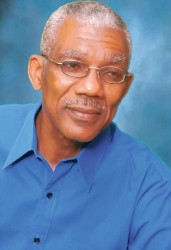President David Granger yesterday dismissed Surin-ame’s reported revival of its claim to the New River Triangle in south-eastern Guyana, calling it spurious but said that he will seek clarification on the matter.
“I read the statement attributed to President Bouterse and as far as I am concerned it does not change the price of rice,” he said at a news conference at the Ministry of the Presidency yesterday, his first since assuming office over four months ago. Reporters were limited from asking questions and at the beginning, were told that Granger only had 30 minutes as he had another engagement.
Suriname online media outfit de Ware Tijd reported on Thursday that Suriname’s President Desi Bouterse told the country’s National Assembly that the New River Triangle (Tigri) issue will be placed “back on the agenda” as he had no choice but to do so.

Granger yesterday said that he will seek clarification on what Bouterse said but any claim to the New River area does not change the fact that the area belongs to Guyana. He said when Minister of Foreign Affairs Carl Greenidge returns from travel duty, he will ask him to verify the report.
Meanwhile, Granger expressed confidence that the Caribbean Community (Caricom) is solidly behind Guyana in its border controversy with Venezuela. Suriname is a member of Caricom.
“I would say, with confidence that the Caribbean States, particularly under the chairmanship of Prime Minister Fruendel Stuart, have always been on our side, they have never let us down and I don’t expect them to let us down,” he said.
Caricom Foreign Ministers recently met on the margins of the United Nations General Assembly and issued a statement on Thursday, reiterating the region’s support for Guyana. However, the ministers stayed away from indicating whether they wanted a juridical settlement of the controversy over the 1899 Aribitral Tribunal Award.
The statement did not say on which day the meeting was held. The Caricom foreign ministers simply noted that Guyana had called for a juridical settlement. Unlike the Caricom Foreign Ministers, the Commonwealth Minister-ial Action Group (CMAG) has endorsed Guyana’s call for a juridical settlement of the Venezuela border controversy and has reiterated its full support of this country in the ongoing row.
This call for a juridical settlement by Guyana is now the lynchpin of its relations with Venezuela and Georgetown would have been expecting unequivocal support for this stance from Caricom. Venezuela does not support the move for a juridical settlement.
Observers say that the lack of clear backing for Guyana’s position is another sign of erosion that Venezuelan petroleum largesse has made in Caricom solidarity with Guyana on the border controversy.
Ties between Venezuela and several Caricom countries have deepened considerably in the Caracas-led alternative economic and political bloc ALBA. Consequently, Guyana has had a more difficult time persuading fellow Caricom countries to back its positions on Venezuela. Caracas has also sent delegations to Caricom countries – some headed by Venezuelan President Nicolas Maduro himself – seeking support for Venezuela’s stance.
Granger said that while the Caribbean is a beneficiary of Venezuelan loans and grants and has joined Venezuelan initiatives such as ALBA and Petrocaribe, he does not feel this would hinder their support. “Don’t feel that life will end if these agreements come to an end. They are favourable, they are expressions of friendliness and we would like them preserved but we are not in a trade-off and I don’t believe any of our Caribbean colleagues are in a trade-off between Guyana and PetroCaribe. I don’t think there is a deal,” he asserted.
“Much of Venezuela’s oil had to pass through the Caribbean so Venezuela is concerned about the Caribbean and has done a lot of work over the past 50 years to build friendships in the Caribbean. But we feel the (friendship) must not be at the expense of Guyana’s territorial integrity,” he declared.
Asked if he was disappointed in the Caricom Ministers failure to show categorical support for a juridical settlement, Granger said in diplomacy, there is no room for disappointment but accepting whatever came from the Heads of Government. “Every state has its own national interest and I expect that the Caribbean States would behave in a manner of their national interests. We got the support of Caricom. Maybe it is not as forceful as some people expected but we are satisfied with the Caribbean Community and (it) remains on the side of Guyana,” he said.
The president added that next month, he will be going to Malta for a Commonwealth leader’s conference and will again lobby and expects support from that body.
The President believes that having international support is an important strategy for Guyana as superpowers such as the United States have nonverbal persuasion in peacekeeping.
“They (the US) have what I would like to call moral suasion. They have influence and they can exert that influence to modify the behaviour of small States and they have been able to do that in the past. Whether they want to deploy that suasion and to restrain Venezuela is another matter…the Venezuela threat has been with us for 50 years and it still persists…so maybe suasion has worked to prevent the thing from generating into violence,” he said.
Granger declared that Guyana will continue to use all of its territory for its economic development and expansion initiatives and will not be intimidated by Venezuela.
“We would certainly like to proceed and this is the undertaking we have giving foreign investors. We are calling on the international community to preserve the security of our country, our territorial integrity,” Granger said. He made reference to the letter of credence he received earlier from new United States Ambassador Perry Holloway recalling at that event, he called on the US to guarantee security for small states.
Granger said that there must be some international system for protecting small States.





